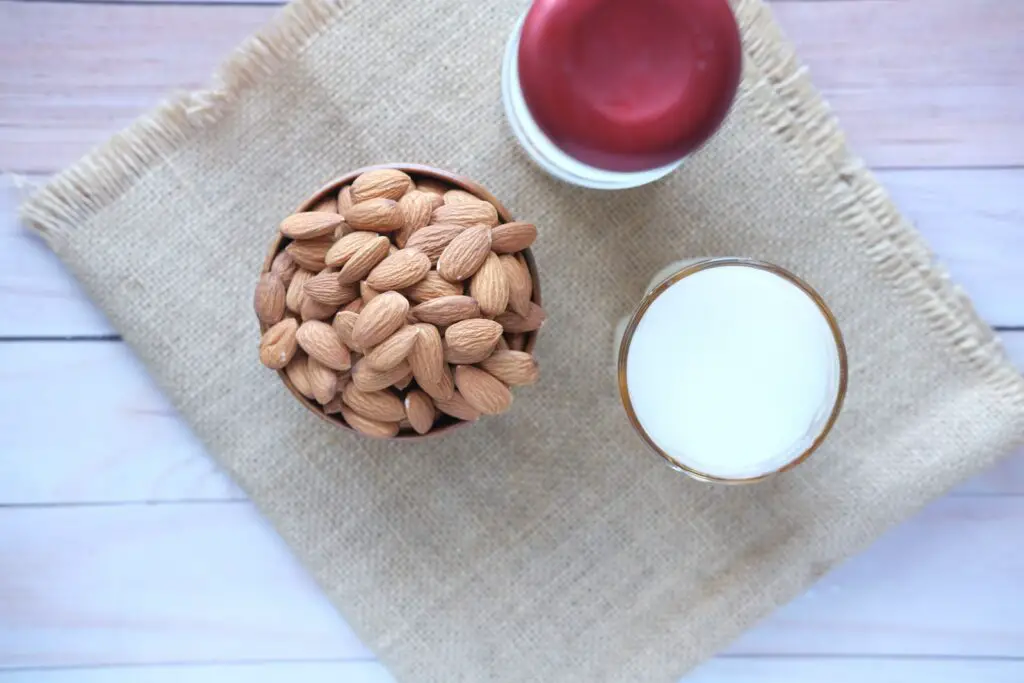To save our planet Earth from environmental degradation, it is crucial to take climate action. Recycling is a potential step to get rid of littering and pollution.
Almond milk is either stored in plasticized paperboard, glass, or plastic bottles. The tendency of recycling is directly related to the type of material used in packaging.
Almond milk cartons are can be entirely recycled. However, there is a little confusion among the masses because cartons are identified as paperboard but are disposed of among plastics.
This will be discussed later in the article.
What Are Cartons?
To move further, it is pivotal to know what is a carton. A carton is recognized as plasticized paperboard that has a circular plastic cap on the top surface.
Cartons have two types- Refrigerated and Shelf-Stable.
Almond milk is widely stored in plasticized packaging called cartons. Almond milk cartons lay in the refrigerated type because they are kept in a refrigerator after opening.
Other almond milk packaging materials may include plastic or glass bottles but they do not identify as a carton.
What Are Almond Milk Cartons Made Of?
In the recycling process, the composition of a specific item plays a pivotal part. Both shelf-stable and refrigerated cartons have different compositions although both of them have plastic and paper boards as a base.
Almond milk cartons are listed as refrigerated cartons and are comprised of 80% paper and around 20% of polyethylene.
Among all the recyclable materials, paper is easily recycled. Polyethylene from the plastic family is entirely recyclable too.
Identification And Disposing Of Almond Milk Cartons
The Installation of recycling bins has made it easier to perform segregation even at individual levels.
It must be kept in mind that almond milk containers, despite having 80% paper, are identified as plastics. While disposing of, almond milk cartons should be thrown into the bin labeled as Plastics.
Make sure to detach the carton’s cap and rinse off the leftover milk to avoid recycling contamination of fiber and the pungent smell of sour milk.
This causes a lot of confusion but when you take a look at the recycling process and the steps involved in it, you will get a better understanding.
The Process Of Recycling Almond Milk Cartons
The process of recycling almond milk cartons lies somewhere between plastic and paper recycling as it is a combination of both materials.
- Disposal-After removing the cap and rinsing off leftover milk from the cartons. The cartons are disposed of properly at the disposal point or the recycling bin at the curbside.
- Segregation-After collection and disposal, separation on the basics of texture and composition occurs. Like natured items are put together and unlike items are filtered out. Once this step is done. In the case of milk cartons, all types of milk cartons are separated and their caps are removed.
- Compression-This step involves compressing larger units of cartons into smaller volumes to ship them to another processing facility.
- Shipment-Compressed cartons are then shipped to a paper mill. Paper mills have huge blenders. Compressed cartons are mixed with water and blended to separate paper fiber from plastic and aluminum (in the case of shelf-stable cartons)
- Recycling-After drying the paper fiber or pulp it is made into recycled tissue paper, notebooks, and even building materials.
The leftover plastic is sent to a plastic recycling unit where it gets converted into other useful recycled products.
Are Almond Milk Cartons Compostable?
Compost, is an organic fertilizer made from decomposed foliage, animal waste, recycled organic compounds, and food waste. It is often used as a fertilizer.
Almond milk cartons have 80% paper in them which leads to a misconception that almond milk cartons are compostable.
Almond milk cartons do not decompose like regular organic compounds.
Hence, almond milk cartons are not compostable and shouldn’t be mixed with the compost mixture.
Is Recycling Of Almond Milk Cartons Worthy
Every little initiative, no matter at what pace, counts.
Milk cartons cause littering which leads to pollution and contamination of nearby areas. Dumping milk cartons at landfill site areas causes overfilling of such sites. Overfilled landfills are responsible for seepage and polluting nearby or underground water bodies.
Recycling almond milk containers reduces littering and ensures a clean environment. Hence recycling almond milk cartons is totally worth the effort.
Environmentally friendly Almond Milk Cartons
To have a sustainable lifestyle, you have to make environmentally friendly choices.
It is convenient to shift to alternatives that are sustainably sane and reusable.
Paperboard boxes can be altered with glass containers as they cause no harm to the environment and the human body.
Another alternative is a reusable steel bottle. Steel bottles are more durable as compared to glass bottles and both these materials are non-toxic.
Reusable high-quality plastic bottles can also be used to keep almond milk safe.
Upcycling Almond Milk Containers
Upcycling is the process of reusing a product.
Almond milk cartons can be upcycled into pen and pencil holders, jewelery organizers, and kids’ crafts.
If you thoroughly rinse off the leftover milk, cut off the top surface and fill up the box with soil, the milk carton can be used as a planter as well.
For upcycling an almond milk carton into a stationery organizer, cut off the top and dry the inside of the carton.
Wrap a decorative paper around the carton and your upcycled stationery organizer is ready.
Conclusion
Almond milk cartons are highly recyclable because they are made of paper and polyethylene plastic layer. After going through the process of segregation, paper and plastics are separated using a huge blender.
Paper from almond milk carton is sent to a paper mill and the plastic is sent to a plastic recycling unit. Almond milk cartons can be recycled into tissue papers, cardboards and building materials.
Milk carton caps are recycled with other plastic materials and turned into various useful products.
Recycling of almond milk cartons reduces littering and overfilling of landfill sites which is the major cause of contaminated ground water.






